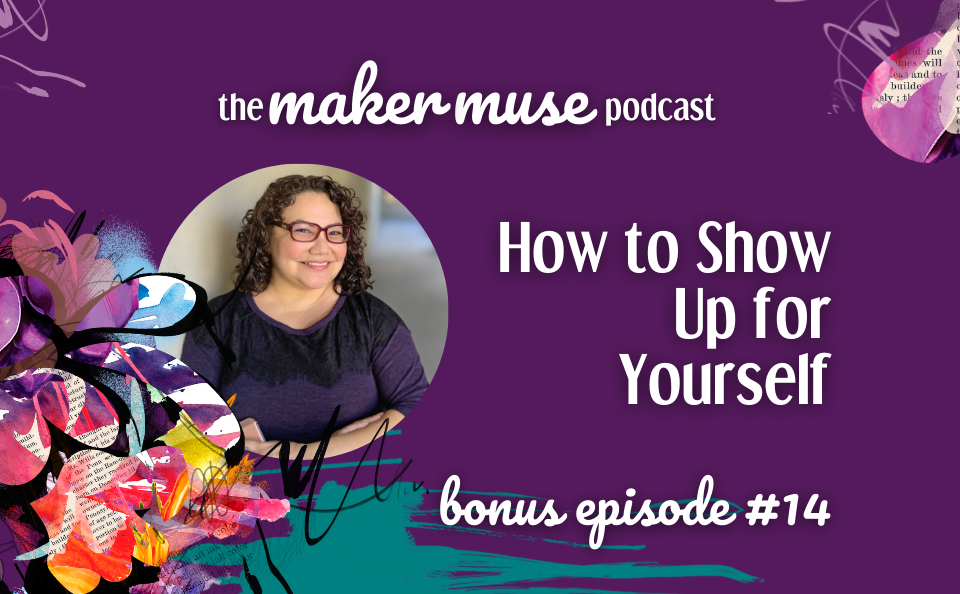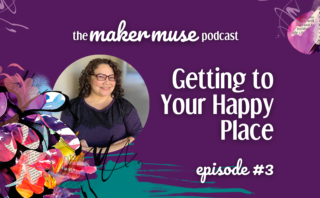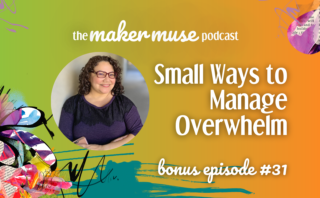
What does showing up for yourself mean? In this mini bonus episode recorded live in my Facebook group, I talk about how it’s about sticking to the promises you make to yourself. It’s making a commitment to YOU. And how doing this in small ways consistently will prove to your brain that when you need to show up in big ways, it won’t have to worry about it. You’ve already given it the proof that you’re capable of it!
3 different ways I cover for how to show up for yourself:
- creating a schedule you can stick to
- setting and respecting your boundaries
- shaping your space to cater to your needs
What does this look like in practice? Here are some examples from this episode:
- Let’s say you want to wake up at 5 am but typically get up at 7 am. Instead of forcing yourself up at 5 am right away and snoozing for two hours, start setting your alarm a little earlier each day so you can slowly work back to waking up earlier.
- Tell your partner what you need from them. If you’re the type of person who just needs to vent once in a while but you’re not looking for a fix right now, say so. If you’re on the receiving end, you can ask “are you looking for a solution or are you just looking to vent?”
- We’re conditioned to believe that our workspaces should be clean and tidy all the time. And sure, some people need clean and orderly workspaces, but not everyone thrives in this environment. Pick what works for you.
The podcast is on hiatus for a few more weeks (hence this *bonus* episode), but I’d love for you to subscribe, rate, and review The Maker Muse Podcast wherever you catch these episodes. ¡Muchas gracias!
Scroll down for a full episode transcript.
This post may contain affiliate links. For more information, please see my Disclosure Policy.*
In this episode:
- 1:03 – The virtual conference has passed but it was Sophie Riley’s Freedom Summit
- 1:07 – The speaker was Paul Levitin of The Happy Healthy Human Podcast
- 4:25 – The TikTok video on work boundaries by @loewhaley
- 8:30 – Want to grab some cool fabric (plus patterns and sewing books)? Online store here
Socialize online
Subscribe to the mailing list and follow The Maker Muse on:
Transcript
[00:00] Buen día y welcome to The Maker Muse Podcast, the place where childfree Spanglish speaking mujeres fuertes are inspired to find their confidence through creativity. I’m Paulette Erato the the Maker Muse. Summer is here mis amiges, so I hope you are staying hydrated and getting rest.
[00:18] Welcome to another bonus episode of The Maker Muse Podcast. Season two is coming soon, but in the meantime, I hope you enjoy this quickie episode about how to make and stick to commitments to yourself. This episode was recorded as a live video in my Facebook group, where I do a weekly training like this every Wednesday. It’s free to become a member of the group. So if you’d like to join me there, I’ll leave you a link in the show notes. And now let’s get into it.
[00:44] Hi friends. Good morning. It’s Wednesday. We stay hydrated on Wednesdays and every day. So I told you at the top of the week, that this week was about showing up for yourself. And I got one response about how you do it for you, but that’s okay because the algorithm doesn’t always show up for us. Does it?
[01:03] There was a virtual summit last week. And one of the speakers was talking about making commitments to yourself. And small ways that you can prove to your brain (see we kinda talk about the same thing) prove to your brain that you are standing up for yourself, that you can show up for yourself in small ways. Because mostly it’s a habit, right? Creating new neural pathways where you believe in yourself, in your brain is all about habitually, doing something over and over so that your brain believes this is who you are. This is what you do. And you can do that in small ways so that when you have to show it for yourself in big ways, your brain believes you can! And that you will! And less of that imposter syndrome seeps up because your brain is not going to be so concerned with if you can do it, but you know, other things like did you eat properly today?
[01:57] And that’s a great way to be right? To release yourself from the shackles of imposter syndrome. That’s possible, but for a lot of people, it’s a struggle. And I know that a lot of you, when you enter this group, list imposter syndrome as, as a problem that you face let’s tackle that. Let’s tackle that, but starting in small ways.
[02:17] And one of the ways that he mentioned that he puts on clients is to set your alarm, and stick to it. Because if you let’s say, for example, decide you’re gonna wake up at 5:00 AM every day, but you’re habitual snoozer and you usually don’t wake up till seven. First of all, that sucks for your body. Don’t do that to yourself. Instead of hitting the snooze button for however many times over the next two hours, just set your alarm for seven. Or if you actually want to wake up at five, get up.
[02:50] By continuing to snooze, you are disproving your commitment to waking up at five to yourself, cuz you weren’t ever really gonna do that. So instead of if you’re a 7:00 AM sleeper wanting to wake up at five, wake up at 6: 50. Just set that alarm slightly earlier and earlier daily, every couple of days, so that your body acclimate to it.
[03:12] But the point is to stick to the alarm that you’ve set and the baby steps you can get for the larger goal, right? So think of these, we talk about bridge thoughts a lot, right? How sometimes the idea, the goal, the affirmation is too far away for you to feel like it’s attainable. If waking up at 5:00 AM is too hard when you’re used to waking up at 7:00 AM, then create little bridge points between those two times. So start setting the alarm just slightly earlier, 6:55, 6:50, 6:45 or 6:30. You choose your increments. But as your body acclimate and you keep sticking to that alarm, it becomes a habit. Your brain starts recognizing “I can do this. I am doing this for me.” So you’re creating a habit, which is much easier to stick to the longer that you do it. But that habit is creating neural pathways in your head that then become easier to travel and the habit sticks. So they kind of go hand in hand.
[04:14] All right. So one that Rosalba mentioned was that she resets and reinforces her boundaries. Is that what she said? She respects her boundaries. So I watched a really great, I dunno if it was a TikTok or a reel yesterday about boundaries at work. And how the younger generation of people entering the workforce, you know, they don’t stand for overtime requests, especially if they’re not getting paid for them and stuff like that.
[04:40] And they just set a boundary. The skit was, the boss was like, you know, we’re really understaffed. We’re gonna need you to stay late to do some work. And the response was, I can stay an extra 15 minutes today because I recognize the urgency here. And they were like, okay, so I’m gonna need you to do it all week. And she was like, no. I said today. Something to the effect of your lack of staff is not for me to fix.
[05:03] I loved that. I wish I’d known that. I tagged my friend, Elise who’s in this group. We both worked for an incredibly toxic environment where, like I said, I turned my phone off on weekends and was reamed for that. These were incredibly toxic situations, but we didn’t recognize them at the time because we hadn’t learned boundaries. And I was only in my twenties and this was one of my first work experiences. I thought this was normal. It had been normalized for me, right? But seeing that play out and watching how those are choices you can make. These are boundaries you can set. And look the culture at your job may not appreciate it. Um, so it might be time to find another job. And I know that’s easier said than done. But if you go into it with strong boundaries and that’s just one example, you might be a happier person, happier worker.
[05:53] There’s also boundaries within yourself and with your support system. Sometimes we need a certain type of support, and we need to ask for that. Because the support I might need is not necessarily what my support system is used to giving me. So if those support needs change, like for example, sometimes I just need to vent to my husband. I just need to get it out, right? Like I need to get the trash thoughts out. And if I did that to a journal, it would not try to find ways to fix the issue for me, right? It would just let me get the trash thoughts out and flush it and good-bye.
[06:28] But another living human being who wants to help you sometimes wants to help you find a solution, as opposed to just being your like depository for your trash thoughts. So a good question to ask if you’re ever on the receiving end of that, is: are you looking for a solution or are you just looking to vent? And we have those conversations because this is a good support system. So that’s another way to show up for yourself, ask for what you need.
[06:55] And then another thing is to keep your space in a way that works for you. Now, for some people they thrive in chaos. Sometimes I do, sometimes I don’t. Right now I don’t. So for myself, I’m going to be letting go of all of that clutter right there, everything that’s on the table behind me, all of that is going away today. Because there’s kind of a mental burden for me when there’s too much clutter in a space. And I’ve let it built up because of projects I had going on fabric, that’s coming in and out of the, the space and stuff like that.
[07:33] But I, I recognize when I need a reset. And it’s like, okay, it’s time to clean the creative space and allow space for the new ideas to flow. And for you, that might be the opposite. Your space might be too clean. And then you’re like, I I’m lacking creativity. It could be your bedroom. It could be your workspace. It could be your car.
[07:53] I know some people are fastidious about keeping their car clean. I’m one of them. And getting into someone’s car that is not as clean, gives me anxiety, but that’s for me to deal with, right? Because they are comfortable and they do this for a reason. So making sure that your immediate space is catering to your needs.
[08:13] Right now, my space is full of crap. And especially if we’re moving to Puerto Rico, I’m assuming, I will not have room for all of this. So I have to start getting it out of the house now, before we move. So I don’t have to pay for storage for it. So it can go into a home that’s it’s actually gonna be used. All of that fabric is going to be for sale. So if you want fabric, let me know.
[08:33] So to recap, when you make a commitment to yourself to show up for yourself, it trains your brain that you are not only capable of this, but you will. When you are called to show up for yourself, you can, and you will. And the way you do that is by creating small little habits that prove that you are doing that. So one of those ways is adhering to your alarm schedule. Setting and enforcing your boundaries. And cleaning up or cluttering your space, whichever one works for you.
[09:04] Alrighty friends. Don’t forget to stay hydrated. Summer’s coming. If you’re in the Southern hemisphere and summer has left, you still need to stay hydrated, no excuses! And that’s a burrito!
[09:18] Thanks for listening to this special episode of The Maker Muse Podcast. Right now I’d like to ask you to please subscribe so you can listen to all the regular things I put out just about weekly. And then tell all of your family and friends about it. I’d really appreciate it if you could rate and review this wherever you’re listening to it right now.
[09:35] ¡Hasta la proxima!




